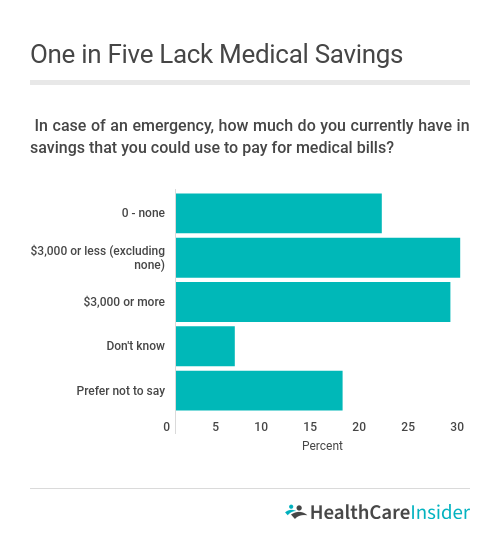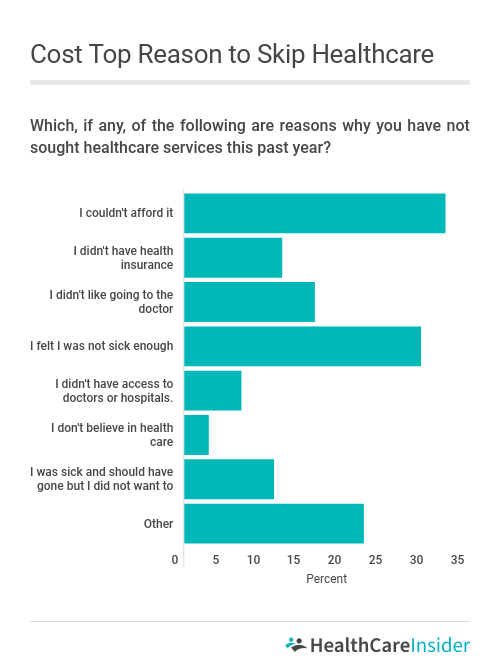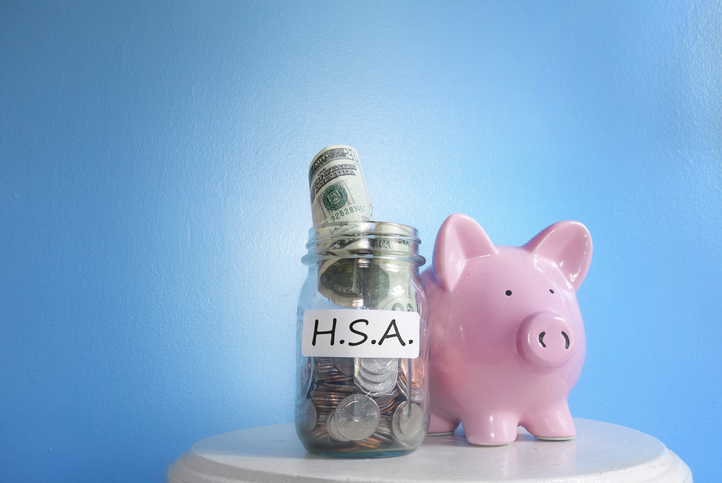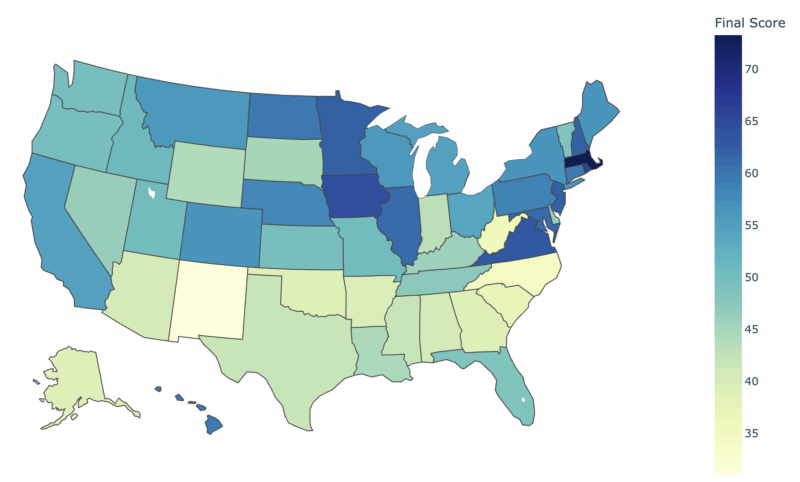Written by Michael LaPick
Healthcare Writer
We want to help you make educated healthcare decisions. While this post may have links to lead generation forms, this won’t influence our writing. We adhere to strict editorial standards to provide the most accurate and unbiased information.
Key Findings
- 56% of U.S. adults said they were either somewhat or very concerned that a health situation in their household could lead to bankruptcy or debt.
- 28% of U.S. adults carry medical debt.
- 32% of U.S. adults have $500 or less in savings for medical bills.
American adults worry that getting sick could lead to financial peril.
More than half (56%) of respondents to a new survey said they were somewhat or very concerned that a health situation in their household could lead to bankruptcy or debt.
That’s among the key findings in a fresh nationwide survey of U.S. adults on healthcare costs by HealthCareInsider.com.

Medical Debt
Nearly three in ten (28%) respondents to the poll said they carry medical debt.
Of those who reported having medical debt, 65% had debts exceeding $1,000.
Surprise medical bills can be a source of medical debt.
Three in ten respondents (28%) reported having received a surprise medical bill in the past year (since October 2019).
Lack of Savings
Only just over half (57%) of U.S. adults contacted for the survey said they have savings to pay medical bills.
21% said they have no savings. 29% had $3,000 or less (excluding none), and 28% more than $3,000.
Among all respondents, 32% had $500 or less in savings; 21% had no savings at all, while 11% had $1 to $500 on hand.

Parts of the U.S. public have avoided going to the doctor or getting medical help because of cost worries.
Just under half of U.S. adults (46%) postponed healthcare services in the past year.
Of those who did, over three in ten (32%) respondents said they didn’t seek healthcare services because they couldn’t afford it.
29% didn’t feel sick enough, 16% didn’t like going to the doctor, 12% didn’t have health insurance, 11% didn’t want to get help (but realize in retrospect they were sick and should have gone), 7% didn’t have access to doctors or hospitals and 3% don’t believe in healthcare.

The lack of health insurance among the U.S. public stems partly from cost.
Of respondents who reported no health insurance (13% overall), more than half (53%) said they could not afford it.
13% each had lost their jobs and employer coverage or were self-employed, 12% said they don’t need health insurance, and 8% said their employer doesn’t offer insurance.
Another 7% were dissatisfied with their previous insurer or provider, and 6% reported they didn’t qualify for employer-sponsored insurance.
Low Comprehension of ACA Subsidies
Despite some U.S. adults saying they lack health insurance due to cost, many are unaware they could qualify for financial help.
Over half (52%) of respondents didn’t know whether you can receive an Affordable Care Act subsidy (a tax credit) to help pay for health insurance if you aren’t eligible for Medicare.
32% believed it to be true that you can receive a subsidy, and 16% said it’s false.
Roughly four in ten (39%) U.S. adults contacted for the poll ranked health insurance as their highest healthcare expense.
15% pointed to medical bills, 8% prescription drugs, 3% each said fitness and nutritional supplements, and 2% alternative medicine.
More U.S. Adults Say They’ll Use Telehealth in the Future
In the wake of COVID-19, more than half (55%) of respondents said they were very or somewhat likely to use telehealth in the future. 45% were not very likely or not at all likely to use telehealth.
Reasons varied among those who said they were not likely to use telehealth.
39% cited a lack of touch and personal interaction, 27% pointed to the possibility of receiving a misdiagnosis, 23% said privacy concerns and 22% cited limited assessment of health issues.
Another 20% cited technology issues, 17% said it was too expensive, and 15% said not being able to run more tests would make them unlikely to use telehealth.
Politics and Healthcare
Over four in ten (44%) pollees said they trust the Democratic Party most to ensure they and their family can obtain affordable healthcare.
28% trusted the Republican Party most. 12% said they trusted independents most to ensure they and their family can obtain affordable healthcare, and 13% were undecided.
Nearly six in ten (59%) U.S. adults reported they were somewhat or very concerned the Supreme Court will strike down the Affordable Care Act.
The Supreme Court is scheduled to hear arguments over whether the ACA should be overturned November 10.
Methodology
HealthCareInsider.com commissioned YouGov Plc to conduct the survey. All figures, unless otherwise stated, are from YouGov Plc. The total sample size was 1,414 adults. Fieldwork was undertaken October 19-20, 2020. The survey was carried out online. The figures have been weighted and are representative of all U.S. adults (aged 18+). The margin of error is 2.6% plus or minus.
Thank you for your feedback!







